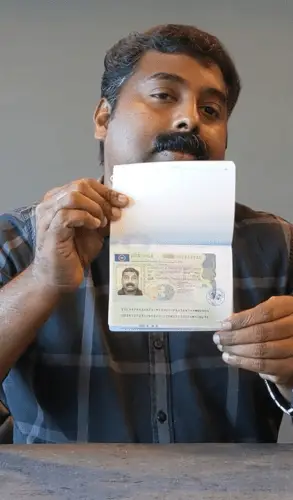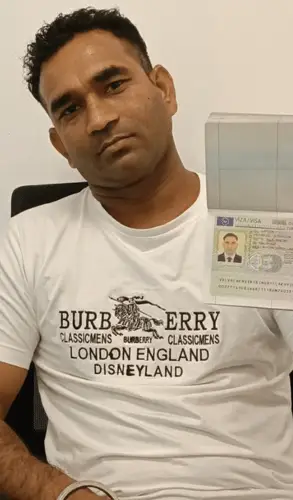
We specialise in sourcing and placing candidates who are ready to make a meaningful impact in the logistics sector. We provide a variety of services to fulfil all your needs. Our services include vetting, training and recruiting for a diverse range of roles. We will collaborate with you to fully grasp your demands and specifications, and we will manage every step of the hiring process, from posting job ads to post-landing assistance.



Our methodology for identifying the best candidates.

Detailed explanation of how we prepare drivers for EU roads, including Code 95 training, PÁV exam, driving license exchange and digital tachograph card issuance.

Expertise in navigating visa and work permits to ensure smooth entry into the EU.

Although focusing on companies, briefly mention how we support drivers in adapting to their new roles, enhancing their reliability and job satisfaction.

Transforce's recruitment processes are designed to ensure we match the right candidates with the right companies. It’s a matter of pride for us that our drivers and technicians become reliable and long-term assets for their employers.
Transforce emphasises transparency throughout the recruitment journey. We involve client company representatives, making them active participants in selecting future team members and reinforcing a commitment to transparency.
The Quality Department guarantees that candidates proceeding with the recruitment process have successfully passed the initial vetting process, ensuring only qualified individuals move forward.
The Documentation Department meticulously creates candidate profiles, aligning them with the client’s company and country requirements. This step involves compiling the necessary documents and job-specific details.
Company Representatives review the candidate profiles we send them, select preferred individuals, and hold in-person or virtual interviews to assess suitability for the roles.
The Processing Department handles visa and TRC applications, collaborating with the client company for employment contracts, work permits, and other essential paperwork. They guide candidates through the entire application and interview process.
Candidates submit their visa/TRC applications to the embassy/VFS Global, with processing times varying from 15 days to 2 months, depending on the specific embassy.
The Pre-departure Department takes charge, preparing candidates for departure. They provide checklists, follow up on required documents, and book tickets based on client company specifications. A briefing on immigration procedures ensures candidates are ready for departure.
Upon arrival in the client country, the Post-landing Team assists candidates, remaining available for support as needed. They actively seek feedback from both candidates and clients to ensure a smooth transition and offer ongoing assistance.
We have an efficient and seamless process to vet candidates before sharing the shortlisted candidate list with companies and setting up a video or audio interview process. Our vetting practices take in the needs of different countries and include the following
Screening is the initial phase of our diligent candidate evaluation process. At this stage, we conduct a comprehensive review of applicants’ qualifications, experience, and background to ensure that they align with our clients’ needs and industry standards.
The theory test assesses candidates’ theoretical knowledge related to the specific role for which they are applying. It measures their understanding of key concepts, procedures, and industry-specific information essential for success in their respective job positions
As a part of our commitment to transparency, we require our candidates to undergo a polygraph test. This scientifically-backed assessment helps ensure honesty and trustworthiness, contributing to a reliable workforce.
The health and well-being of our candidates are very important to us. Our medical tests are designed to examine the physical fitness and overall health of applicants, ensuring they are fit for the demands of the roles for which they are applying
For roles that involve driving heavy vehicles, the reverse parking test evaluates candidates’ practical skills in a specific aspect of driving. This test makes sure that candidates possess the necessary skills to navigate and park vehicles with accuracy, resulting in efficiency on the job.
Our Cargo Vehicle Training Programme delves deep into Code 95 requirements, covering topics such as vehicle dynamics, road safety, and eco-driving techniques. It includes a well-rounded curriculum that aligns with industry standards and regulatory compliance. This training includes
Drivers are taught the latest traffic laws and regulations, emphasising compliance to ensure road safety.
Drivers practise manoeuvres like turning, reversing, and parking to improve their control over the vehicle in different situations.
Drivers are taught techniques to minimise fuel consumption, reducing both cost for the company and environmental impact.
Drivers learn the importance of positive interactions with customers, representing the company in a professional manner.
Proper techniques for loading and unloading cargo are covered to ensure the safety of both the drivers and the goods.
Familiarisation with modern navigation systems and telematics tools helps drivers optimise routes and stay connected.
The programme includes information on maintaining physical and mental well-being, as long hours on the road can impact a driver's health.
Understanding the basics of truck systems, including maintenance checks and troubleshooting common issues, is a crucial component.
Training includes responding to emergencies such as brake failures or adverse weather conditions, ensuring drivers can handle unexpected situations.
Understanding the environmental impact of truck operations and the methods to minimise emissions is a key focus.
Effective communication with dispatchers, colleagues, and other commuters is emphasised to ensure smooth operations.
Drivers are trained on security protocols to safeguard the truck and its contents during transit.
Understanding and utilising ELDs for accurate and efficient logging of driving hours is a vital aspect.
Covers strategies to manage fatigue and ensure drivers are alert and focused during their shifts.
Transforce helps provide comprehensive training on tachograph usage, emphasising accurate record-keeping, compliance with legal requirements, and maximising the benefits of this technology.
Introduction to tachographs and their role in monitoring driving activities.
Overview of relevant local and international regulations governing tachograph usage. Understanding the importance of compliance with driving and resting hours.
Detailed explanation of maximum driving hours and mandatory rest periods. Importance of adhering to prescribed limits for driver well-being and road safety.
Introduction to the analysis of tachograph data to better manage driving schedules. Utilising tachograph information for improved efficiency and compliance.
Practical exercises with simulated tachograph scenarios. Q&A sessions to address driver queries and concerns.
Introduction to analogue and digital models, and their features.
Step-by-step guidance on correctly recording activities on analogue and digital tachographs. Practical demonstrations on inputting manual entries and annotations.
Guidance on handling unforeseen circumstances, exceptions, and technical issues. Procedures for dealing with missing data or malfunctions.
Tips for efficient trip planning to maximise driving hours within legal limits. Strategies for managing fatigue and staying alert during long-haul journeys.
Transforce and LSC bring an approach to driver training with practical left-hand side driving simulations. These simulations immerse participants in realistic scenarios, allowing them to develop the skills needed for safe and confident left-hand driving. The training includes:
Familiarisation with handling steering wheels on the left side of the cab, and having better judgement when overtaking or making turns.
Guidance on staying in the designated lane to prevent congestion and enhance road safety. It also allows for efficient traffic flow, especially on highways and busy routes.
Familiarisation with modern navigation systems and telematics tools helps drivers optimise routes and stay connected.
Introduction to traffic rules that apply to left-hand side driving. This includes understanding road signs, traffic signals, and roundabout navigation.
Teaching drivers to be adept at judging distances and speeds for safe overtaking manoeuvres. Covering making turns at intersections as well.
Truck driving simulators play a crucial role in training drivers for left-hand side driving conditions, providing a realistic environment to practise and enhance driving skills without the risks of on-road training. Training includes the following
Drivers start by getting acquainted with the simulator equipment, including the steering wheel, pedals, and dashboard. Instructors explain the simulation software and its capabilities, creating a comfortable learning atmosphere.
Introducing drivers to fundamental road rules, traffic signs, and signals. Participants navigate through simulated urban and rural environments, learning to obey speed limits, yield the right of way, and follow road etiquette.
Simulations include various weather scenarios, such as rain, snow, and fog, to train drivers to handle adverse weather conditions. Participants experience reduced visibility and slippery roads, learning how to adjust their driving style accordingly.
Drivers learn about the impact of cargo weight on vehicle dynamics and braking distances. Simulations involve transporting different types of cargo and teach drivers to maintain stability and balance while driving
Instructors create specific scenarios tailored to individual training needs, such as city driving, highway navigation, or specialised freight transportation.
Drivers learn to control the virtual truck by practising tasks like accelerating, braking, steering, and shifting gears. This helps drivers become comfortable with the simulator's controls before moving on to more complex manoeuvres.
Drivers engage in exercises that focus on proper turning techniques, lane changes, and parking manoeuvres. The simulator provides instant feedback on performance, helping drivers refine their skills and build confidence.
The training includes simulations of emergency situations like sudden braking, tyre blowouts, and evasive manoeuvres. Drivers practise reacting swiftly and making decisions under pressure, enhancing their ability to handle unexpected events on the road.
Training includes virtual long-haul trips, allowing drivers to experience fatigue management and long-distance driving challenges. Instructors emphasise the importance of proper rest breaks and staying alert during extended periods on the road.
After each simulation, drivers receive detailed feedback on their performance, including areas of improvement. Instructors review the results with participants, offering guidance to enhance their skills.
Beyond technical capabilities, our programme addresses the challenges drivers face in adjusting to new cultures and navigating diverse regulations. Modules cover industry standards, compliance needs, and European driving etiquette. They cover:
Drivers are introduced to the different traditions, customs, and social norms of European countries. Emphasis is placed on recognising and respecting the diversity of languages, religions, and lifestyles.
Drivers are taught specific traffic regulations and road signs of each country. Understanding local customs, like greetings and gestures, contributes to creating a positive impression and building rapport.
Awareness of emergency services and protocols in different countries is covered. Drivers are shown how to seek assistance, report incidents, and access emergency services in diverse cultural and linguistic environments.
An understanding of local cuisines and eating habits helps drivers make informed choices when selecting meals on the road. Recommendations for culturally suitable rest stops are also provided.
Drivers are taught phrases and terms commonly used in different European countries. Special attention is given to non-verbal communication cues to avoid misunderstandings and promote positive interactions with locals.
Sensitivity training helps drivers navigate cultural differences with respect and openness. This includes understanding cultural taboos and practices that vary from one region to another. Case studies and real-life scenarios are used to illustrate potential challenges and offer practical solutions.
Covers any logistical challenges that may arise due to cultural differences, like working hours, holidays, and business practices. Strategies for effective time management and coordination with diverse schedules are discussed.
The training includes interactive workshops and simulations to allow drivers to apply their cultural knowledge in a controlled environment. This hands-on approach enhances their ability to adapt to various cultural scenarios.
Completing the course gives drivers certificates that are recognised worldwide, making them more likely to find jobs in Europe.
© Copyright 2024 | Transforce | All Rights Reserved | Site designed by TEAMAK